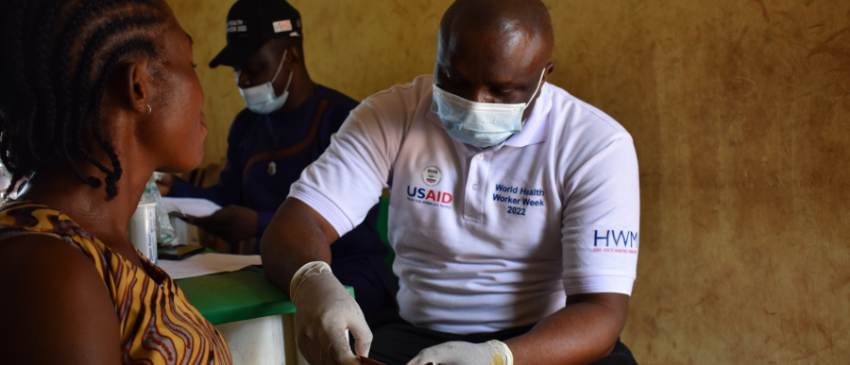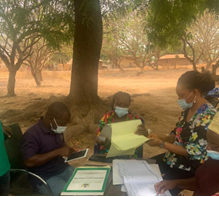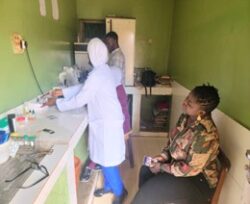
Mobilizing the Private Sector to Fight Malaria
Malaria remains one of the world’s most deadly infectious diseases, threatening health and livelihoods globally. In 2023, there were an estimated 263 million cases of malaria and 597,000 deaths globally.[i] Nigeria is the country most affected by the disease, accounting for 31 percent of all malaria deaths worldwide.[ii] Experts estimate that 97 percent of Nigeria’s population is at risk of infection, and the economic burden of malaria, including prevention, treatment, and other malaria-related expenses, such as lost labor, was estimated at $1.6 billion in 2022, with projections suggesting it may increase to $2.8 billion by 2030.[iii]
Banyan Global supports the implementation of the U.S. President’s Malaria Initiative for States (PMI-S) project in Nigeria, the United States Agency for International Development (USAID)’s flagship malaria project, as a member of the PMI-S consortium led by Management Sciences for Health. The project supports the Government of Nigeria through its agencies at the federal, state, local government area (LGA), and community levels to reduce deaths among mothers and children under five by delivering high-quality services for managing malaria and its complications and preventing malaria during pregnancy. Banyan Global’s role is to lead PMI-S efforts to strengthen malaria case management in private health facilities.

Banyan Global Private Sector Advisor Theresa Adaji (right) works with private health facility staff to analyze their malaria reporting statistics
With 60 percent of Nigerians relying on private health facilities for their medical care, Banyan Global focused its efforts on strengthening malaria case management at private facilities[iv]. Improving malaria case management in these facilities is crucial in the fight against malaria. However, outdated and incomplete government records of private facilities make it difficult to determine which malaria services are available at specific locations. Banyan Global responded to this challenge by conducting comprehensive mapping surveys of private health facilities, laboratories, and pharmacies in selected states including Akwa Ibom, Benue, Oyo, and Plateau. The mapping exercises informed the project’s private sector engagement strategy by providing information on where programming was most needed and could have the greatest impact. Over 3,000 interviews were conducted with private sector health providers in the four above-mentioned states, and the mapping surveys identified a total of 2,143 private health facilities, 808 private pharmacies, and 379 private diagnostic centers and laboratories in those four states.
The mapping assessments revealed significant weaknesses in the ability of private health facilities in Akwa Ibom, Benue, Oyo, and Plateau states to diagnose and treat malaria. For example, in Plateau state, only 27 percent of staff in private facilities had received training on malaria diagnosis and treatment in the past year, and in Benue state, only 58 percent of private facilities had malaria rapid diagnostic tests (mRDTs) in stock at the time of the survey. The PMI-S project put an action plan in place to help remedy these weaknesses.
In response to the need for greater training among state health professionals, Banyan Global collaborated with the State Ministries of Health (SMOH) to provide training to staff from selected private health facilities on malaria diagnosis, case management, and reporting. Banyan Global and the state ministries selected the facilities based on their location and patient volume to maximize impact. As of 2024, PMI-S provided training on the use of mRDTs and malaria treatment to staff from 127 private health facilities in Oyo, 111 private facilities in Akwa Ibom, 67 private facilities in Benue, and 51 private facilities in Plateau.
“I find this training extremely useful, . . . I had forgotten much on malaria management. Before, we were told that once a person has fever, it is malaria, . . . but now, the emphasis is on testing.”
– Chief Medical Director of a private health facility in Ikot Ekpene, Akwa Ibom

An mRDT demonstration at Sunnah Clinic, Barkin Ladi, Plateau
To ensure the training received by private health providers was integrated effectively, Banyan Global and SMOH professionals conducted follow-up mentoring visits to the participating facilities. The mentors provided on-the-job tutoring and troubleshooting for staff. For example, prior to the training, many private facilities relied on inaccurate microscopic analysis and outdated medications to treat malaria. During the mentoring visits, Banyan Global’s team explained the benefits of using mRDTs to facility staff and management.
In Plateau state, PMI-S reported that 20 facilities initially using microscopy as their primary diagnostic tool recorded more than 90 percent positivity rates. After the project’s training and mentoring sessions, these facilities began using mRDTs regularly, which reduced test positivity rates to a more realistic 66 percent. Improving the rates of accurate diagnoses helped the private health facilities focus on the correct treatments and positively impact patients’ lives.
A client at a private health facility in Plateau told the PMI-S team that she brought her three-year-old son to the facility several times over a period of weeks because he had a consistent fever. The facility kept diagnosing him with and treating him for malaria. However, a doctor gave him a more complete examination and realized her son had tonsillitis, which was causing the fever. The use of an mRDT might have facilitated an accurate diagnosis more quickly.
– PMI-S Survey Respondent
Through Banyan Global’s work under the PMI-S project in Nigeria, private health facilities are learning how to better diagnose and treat malaria, taking important steps to eliminate malaria in their country and save lives.
[ii] World Malaria Report 2023: What You Need to Know – United to Beat Malaria
[iii] Nigeria and the malaria epidemic, Punch, December 18, 2024
